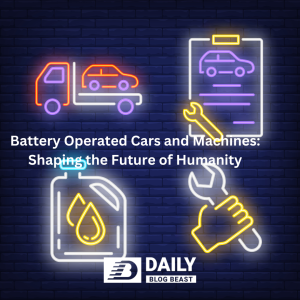Introduction
The rapid advancement of battery technology has ignited a revolution that is reshaping the way we live, work, and commute. Battery-operated cars and machines are at the forefront of this transformation, promising a cleaner, more sustainable, and technologically advanced future. In this essay, we will delve into the myriad ways in which these innovations are poised to shape humanity in the near future.
I. Sustainable Mobility
One of the most significant impacts of battery-operated cars is their contribution to sustainable mobility. Traditional internal combustion engine (ICE) vehicles have long been a major source of greenhouse gas emissions, contributing to climate change. Battery-electric vehicles (BEVs) are changing the landscape by offering a clean alternative. With zero tailpipe emissions, they play a crucial role in reducing air pollution and greenhouse gas emissions, helping combat climate change.
Reduction in Air Pollution:
BEVs reduce air pollution in urban areas, leading to cleaner and healthier cities. The absence of tailpipe emissions translates to improved air quality, reducing the burden of respiratory illnesses among urban populations.
Climate Mitigation:
The widespread adoption of BEVs will significantly contribute to meeting global climate targets. Lowering CO2 emissions from transportation is essential in mitigating climate change, and BEVs are a key solution.
II. Technological Advancements
Battery-operated machines are not limited to cars but encompass a wide range of applications, from smartphones to industrial equipment. These machines are driving technological advancements that will shape the future of humanity in various ways.
Energy Storage:
Beyond vehicles, batteries play a critical role in storing renewable energy. This facilitates the transition to sustainable energy sources like solar and wind power, reducing our reliance on fossil fuels.
Portable Devices:
Battery technology has revolutionized the way we communicate and access information. Smartphones, tablets, and laptops have become an integral part of modern life, shaping the way we work, communicate, and entertain ourselves.
Healthcare:
Battery-operated medical devices, such as pacemakers and insulin pumps, have transformed healthcare, improving the quality of life for millions of patients. These devices enable constant monitoring and precise drug delivery.
III. Economic Opportunities
The rapid growth of battery-operated technology creates numerous economic opportunities that will impact humanity in the near future.
Job Creation:
The battery industry is experiencing exponential growth, leading to job creation in research, manufacturing, and maintenance. As the demand for electric vehicles and renewable energy systems rises, so do employment opportunities in these sectors.
Green Economy:
Battery technology is a cornerstone of the green economy. Investing in clean energy and sustainable transportation not only benefits the environment but also stimulates economic growth.
IV. Urban Planning and Infrastructure
Battery-operated vehicles are transforming urban planning and infrastructure development.
Charging Infrastructure:
The proliferation of electric vehicles has spurred the development of charging infrastructure, reshaping urban landscapes. Charging stations are becoming commonplace in cities, offering convenient access to electricity for vehicle owners.
Reduced Traffic Noise:
Electric vehicles are quieter than traditional vehicles, reducing noise pollution in urban areas. This change in noise levels can improve the overall quality of life in cities.
V. Energy Independence
Battery technology contributes to energy independence by enabling the storage of renewable energy and reducing dependence on fossil fuels.
Resilience:
Battery storage systems provide backup power during blackouts and emergencies, enhancing energy resilience in communities.
Grid Stability:
The integration of batteries into the electrical grid enhances stability by smoothing out fluctuations in power supply from renewable sources.
VI. Environmental Conservation
The adoption of battery-operated machines is instrumental in environmental conservation efforts.
Reduced Resource Extraction:
Transitioning from fossil fuels to battery technology reduces the need for resource-intensive activities like oil drilling, minimizing the ecological impact.
Protection of Ecosystems:
Electric vehicles reduce habitat destruction and pollution associated with fossil fuel extraction and transportation.
VII. Global Impact
The proliferation of battery-operated technology is not limited to developed countries; it has a global impact.
Energy Access:
Battery technology can provide off-grid communities with access to electricity, improving living conditions and enabling economic development in remote areas.
Global Collaboration:
The development of battery technology fosters international cooperation in research, manufacturing, and sustainability efforts.
Conclusion
Battery-operated cars and machines are driving profound changes that will shape the future of humanity in the near and distant future. They offer solutions to some of the most pressing challenges, from climate change to urbanization. As we continue to harness the potential of battery technology, it is imperative that we prioritize sustainability, inclusivity, and responsible resource management to ensure a brighter future for all. The journey towards a battery-powered world is not without challenges, but the rewards in terms of environmental, economic, and technological progress are well worth the effort.


